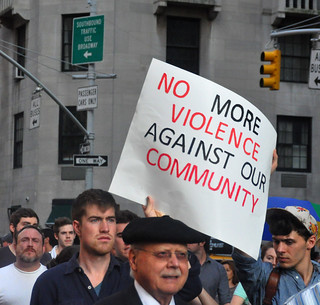“Hey, are you Polish?”
The question, though incongruous from a stranger as my two friends descended a busy staircase into the West 4th Street subway station, seemed innocent enough, and -- in fact -- one of them is.
The next question was even more out of place, although the intent was not immediately clear: “Are you faggots?”
My friends report that at first they thought the stranger was kidding around; an inside joke on the gayest corner of the gayest city east of Mrs. Madrigal. There has been much debate in the “community” over whether we should neutralize the venom of that word by playfully throwing it around, much as another two-syllable word has been co-opted by some of those against whom it was used. We know people who do that, with that word. The stranger had an accent, and sometimes people from other places use words differently than we do, and they were a little buzzed (they were, after all, celebrating their tenth anniversary). In a city they know well, and -- a mere block from Stonewall on a Saturday night -- they had no reason to be particularly wary.
So they said yes.
What followed happened so quickly that they struggled to recall it in detail… to the doctors, to the cops, and then to me. In a nutshell, the stranger did not like that answer, and he made that brutally and physically clear, while a station platform full of people fixed their eyes back on their phones and did nothing, said nothing. The birds are angry. Can you blame them?
Eighteen hours later, my friends finally made it home, having been up almost all night retracing their steps, paging through mugshots. One of them required stitches near his eye and may need surgery for facial fractures. They are both stunned, angry and sad. The city whose welcome we have come to take for granted now feels like a house that had been robbed.
 |
| Protest in Greenwich Village after Mark Carson's murder PHOTO CREDIT: Michael Fleshman Used under Creative Commons License |
My friends know they are lucky that what happened to them wasn’t worse. They are home eating soft foods because it hurts to chew, but they are alive. The police and doctors took their report seriously and told them they had done nothing wrong. We can be grateful: this would not have been the case thirty years ago.
As I write this, an invitation to a male couple’s wedding, which will be valid in the eyes of the church and the state, sits on top of today’s mail. My straight friends treat my partner and me like members of their families, and their kids say “uncle and uncle” without even puzzling at that idea. I think they would find a rotary phone more confusing.
It is clear, however, that some around us remain so threatened by the evolution of our rights and the normalizing of our place in the culture that the only way they can reassure themselves of their power is by lashing out: with words, with fists, with bullets. The rash of Jim Crow-evoking legislation that popped up around the country in recent weeks, was -- while failing to become law -- still successful at reinforcing the us-and-them mentality that drives such paranoia in some quarters. We can celebrate how far we’ve come, but if we let ourselves believe for a minute that the struggle is over, it is at our peril.
“It's unfair to be called a faggot your entire life; however, the slur becomes most dangerous when you let it no longer faze you.”
- PAUL FLORES